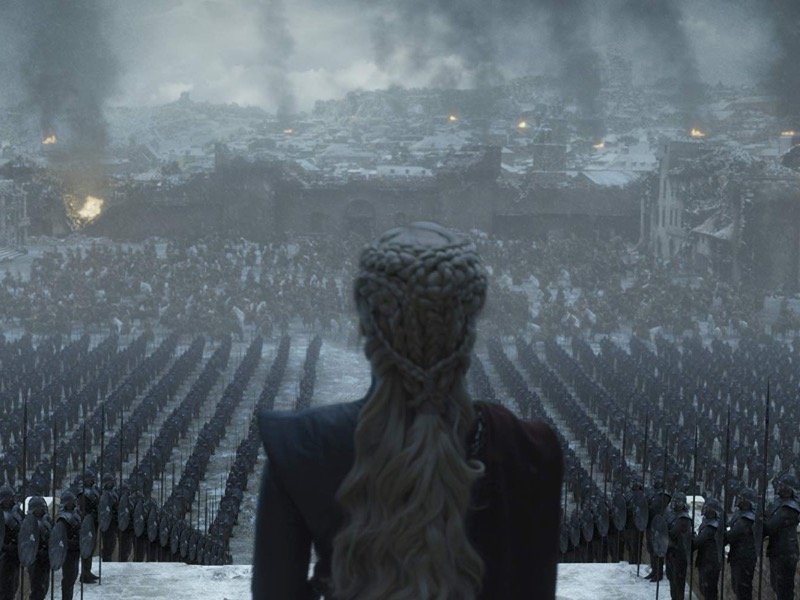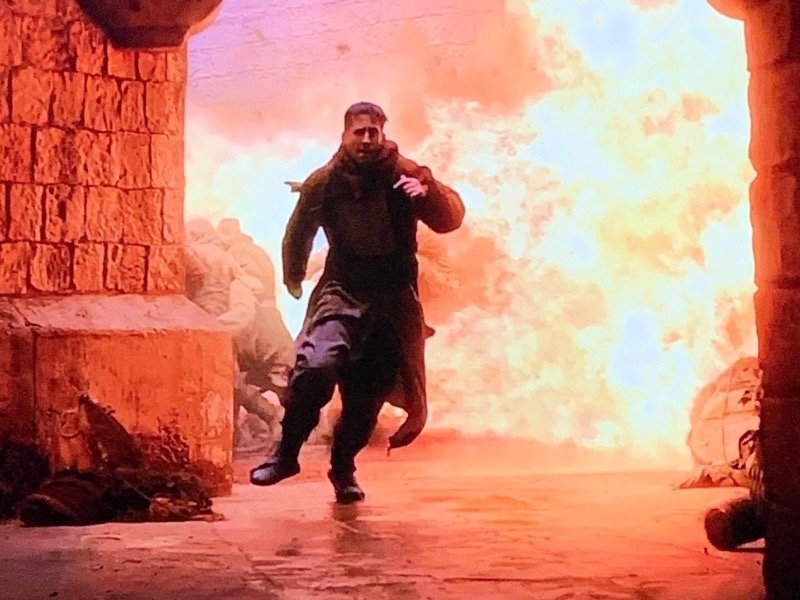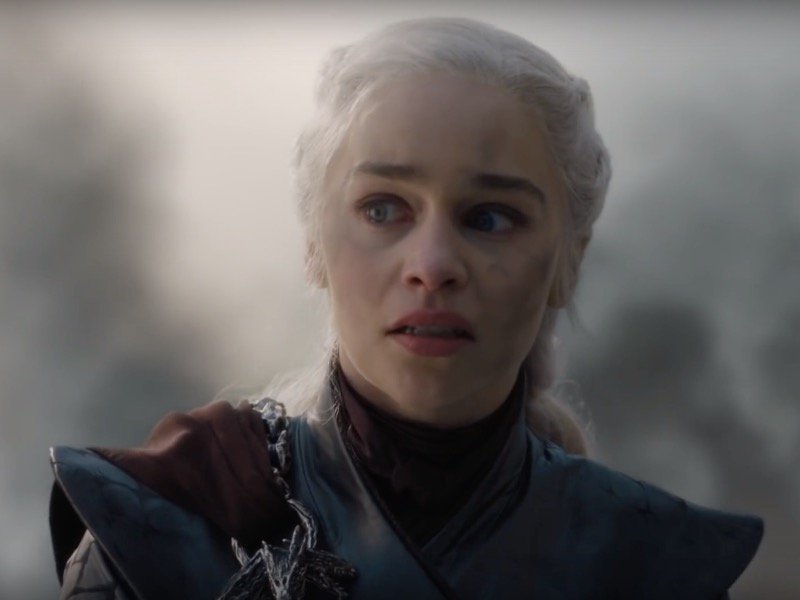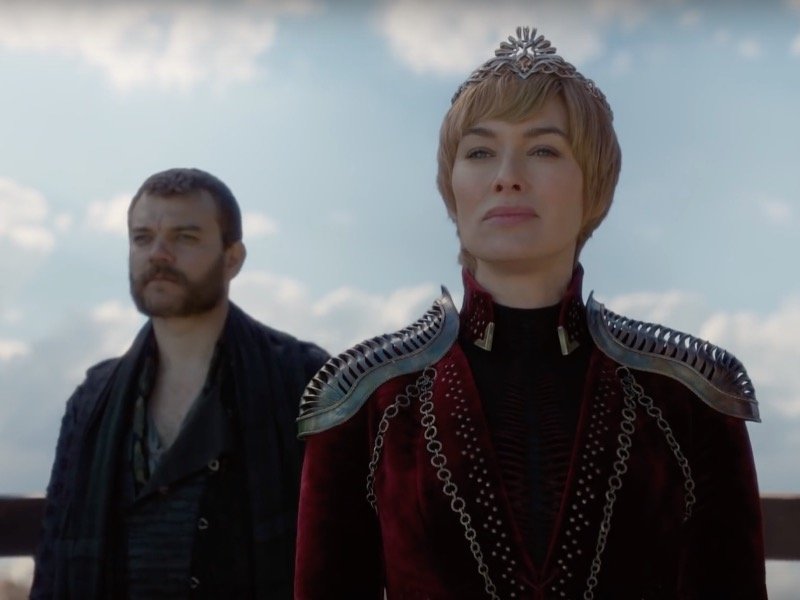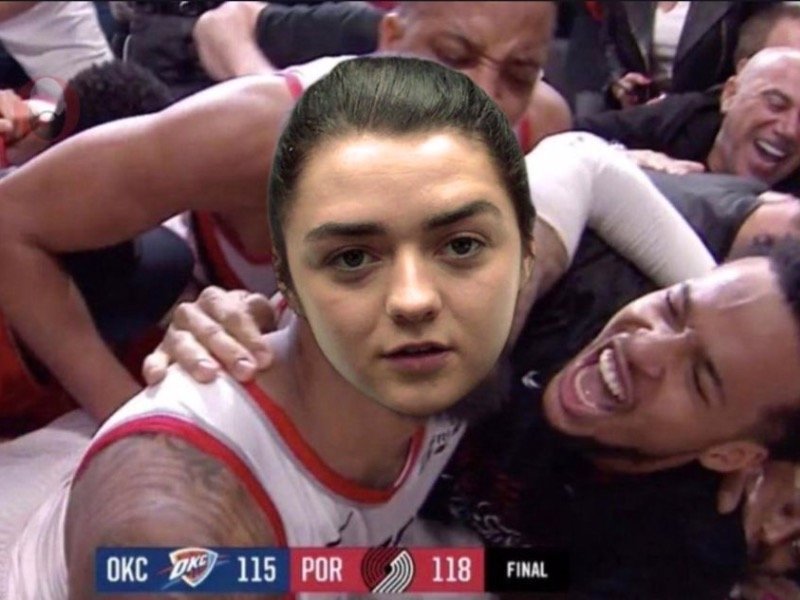After eight years, eight seasons, a whole lot of traumatic deaths, a decreasing amount of dragons and what we can all agree was probably too few episodes for all the story that needed to be told, "Game of Thrones" came to its epic conclusion Sunday night. So who amongst the players of the game won? Who died? And who is going to get fired because they let a water bottle make an unexpected cameo appearance?
a water bottle in King’s Landing!! #got #gameofthrones pic.twitter.com/mwGQlsLwnh — Beth (@bethisloco) May 20, 2019
Here are the five big takeaways from the biggest finale in quite some time.
1. What, you were expecting something rewarding?
Indeed, who could've expected that "Game of Thrones" – the show that murdered its main character in the first season, pulled the Red Wedding on audiences and in general has attempted to slap every cliche and heroic convention in the face with a big crossbow – would end on a surprising and decidedly unrewarding note?!
Instead of big dramatic heroics – well, minus Drogon torching the Iron Throne and turning it into the Iron Smudge after discovering that Jon Snow stabbed Dany to stop her fiery brand of "freedom" from spreading – and obvious winners and losers, most of the finale was a sad, often bittersweet and melancholy exercise in a peculiar middle ground.
Instead of the nightmare of Mad Queen Dany on the throne – or the even worse nightmare of boring, milquetoast, falling-upward Jon Snow – we got Bran Stark due to some squabbling amongst lords and ladies and Jon's pretty fast change of heart. Arya didn't end up pulling out her murder tricks again – though she certainly has them in her back pocket, as Yara Greyjoy found out at the meeting; instead, she's decided to sail the globe and find whatever's west of Westeros. Sansa didn't get the Iron Throne, but she did get the crown of the fully free Winterfell. And noble doof Jon Snow wound up pretty much right back where he started: on the Night's Watch.
By the end, with Tyrion as the hand of the new oddly dazed king, bickering at the table of King's Landing's congress about building brothels (you'll TOTALLY never guess, but that was Bronn's idea), you're not sure if it's a happy ending, a sad ending, a troubling ending – or even an ending period, since it feels like any of the story threads could easily be spin-off material. Is this just more of the wheel Dany wanted to break – just without the Iron Throne in the middle as the axis making it turn? (Considering the lords and ladies, including Sansa, shot down the idea of a democracy with a smirking chuckle, probably.) Or is this a sign of change, however slight? Honestly you could go in either direction.
And yet that all feels about right, even if the rocky, stumble-filled path here lessened its impact. "Game of Thrones" was always a show about cold and cruel realities, about the fickle and unpredictable ways of power and monarchial rule. And so it seems right that the show ends with some triumphs, some defeats and some "huh, I suppose that was option too" reactions. It's hard to be satisfied by the ending, but it's also hard to be angry with it too. In the end, it feels ... just about right, at least on the page and in theory. In practice ...
2. Well, no, but something more rewarding than THAT
Maybe the finale will sit better in the stomach over time, much like "The Sopranos" or "Mad Men" finales became more satisfying and thoughtful the more audiences chewed on them. But those television shows also had stronger and more consistent storytelling leading up to those big final bows. "Game of Thrones" didn't have that, thanks to its shortened final two seasons and its "moments first" storytelling approach – and as a result, while some of the finale's unrewarding nature seems intentional and in line with the rest of the show's themes, some of it feels the result of clunky scriptwriting landing on right endings but in the wrong way.
We've already litigated the Dany Mad Queen twist, how while the pieces were all foreshadowed, the work needed to make the final emotional leap was rushed and unearned. They built her story as a tragedy, of the corrupting power of power, and that's how it fittingly ended – even if some big steps were jumped in the final stretch.
But how on Earth's name are we supposed to feel about Bran now as the winner of the Iron Throne? It's not a bad pick – a person with basically all the world's memories seems like a smart choice, one who would hopefully learn from the past – and, again, maybe all of this will have more flavor the longer the finale marinates. But considering how comparatively little time we've truly spent with that character, and how little we get from him now as a character because he's a pretentious weirdo philosophy undergrad, it's hard to get a read on the full message the show is sending with this pick.
Even his big line accepting the throne – "Why do you think I came all this way?" – is muddled enough to be misinterpreted as he foresaw and allowed the slaughter of King's Landing with the aim of claiming the six kingdoms. Again, it's not an uninteresting choice, but the show didn't do the work to make this intelligent but aloof pick mean much more than a curveball.
The finale leaves the audience with a lot of question marks and uncertainty in how they're supposed to feel – which is fine and fitting. But it also feels like a lot of those question marks are supposed to be more like periods.
In the end, the grand takeaway – complete with a cameo from a literal first edition copy of "A Song of Fire and Ice" – is that stories are the ultimate power and the ultimate currency. But considering the slipshod manner "Game of Thrones" has gone about telling its own story over the past two seasons, that message – much like Qyburn's giant crossbows – doesn't quite pack the punch it wishes it did.
3. Drogon for president
With all of the rushed writing and inconsistencies over the course of these past two seasons, it seems only right that the most earned emotional beat was a freaking dragon. Drogon coming down from the sky to discover his slain mother, his sad pet-like poking of the body and then murdering the Iron Throne for emanating the metaphorical sway and power that drove his mother mad was easily the most emotional moment of the series finale. Or, as the internet's decided, maybe Drogon just assumed the pointy chair stabbed his mom with the pointy object because he's a murder dragon and not Detective Poirot.
Either Drogon is the SMARTEST dragon in the world as he knew the corrupting power of the Iron Throne led to Dany’s downfall or he’s the stupidest and saw a knife in Dany and assumed it was the evil chair made of knives that killed her & he wanted revenge lmao#gameofthrones pic.twitter.com/PryyvUgDvR — laney 🦊 (@NimraenArt) May 20, 2019
Still, when he grabbed Dany's corpse and flew off, tired of this world and its political backstabbing (or front-stabbing in Jon Snow's case), it was the moment that moved me the most during the entire episode. Maybe it's just my own personal new puppy-dad-ness infecting my critical opinion. Or maybe that was perfectly by design. After all, what better way to say that politics is a corrupting disease, power even more so, than by giving the most touching, most human sequence of the show's finale to the fire-belching lizard monster doing its best impression of a sad puppy.
Also, he starred in the best shot from the series finale, so well done.
Super on the nose, but a great fucking shot, nonetheless. pic.twitter.com/f01IjEed5a — Ali Arikan (@aliarikan) May 20, 2019
4. Peter Dinklage wins the Iron Throne of acting
"Game of Thrones" will win a lot of awards and nominations come TV trophy season – some of them earned, some of them less so – and hopefully one of them will belong to Tyrion Lannister, aka Peter Dinklage. Dinklage was already a respected actor before HBO's monolith of a hit show, but "Game of Thrones" turned him into a household name and gave him easily the most iconic character he'd ever had – and probably will ever have – in this fleshed out, witty yet wounded, smart but not as much as he thinks soulful schemer who drinks and knows things.
So what better performance to serve as the crux of the final episode than Dinklage? Most of the finale – especially the first third, starting right from the opening shots of walking through the carnage to crying over finding the final Lannisters in the rubble – put the emotion and the storytelling directly on his shoulders to carry and convey to the audience, and Dinklage was up to the task and then some.
In some cases, he even effectively pitched some of the finale's tougher storytelling sells. He hits all the right notes in his prison-cell conversation with Jon Snow, doing a lot of the heavy-lifting explaining Dany's deteriorating mental state that the script should've done this past season. Then if any other performer was the one to pitch "Bran the Broken" as the final winner of the game of thrones, the idea would've landed even worse. (Can you imagine if Jon Snow threw that idea out? The internet would've laughed for days!) But with Dinklage's heart-felt delivery and emphatic gravitas in the scene, you almost see what he's getting at. Almost.
During these late seasons, as the script became more bulletpoints, the spectacle became the star of "Game of Thrones." But Dinklage's final performance helped remind the audience what truly hooked us in the beginning: the smart, interesting, lived-in characters.
5. We got our money's worth
There's been a lot of "Game of Thrones" fans doing their best Drogon impressions these past two seasons and burning the show and its creators to the ground. And in fairness, it's been a sloppy dismount. But "Game of Thrones" will likely be remembered for the things it accomplished over the entirety of its run rather than the things it bungled while trying to stick the landing.
At its best, "Game of Thrones" was a smart, thoughtful spectacle that made backroom political wheelings and dealings as exciting as the showy fantasy elements that began on the show's borders. It pulled off gigantic surprises that took the TV-watching nation utterly off guard and created characters beloved enough to feel betrayed by, and it changed the scale of what people expect from television – from the size and depth of the cast to the size and expense of its battle sequences. There were shots on this show that were more memorable and cinematic than those shown at actual cinemas.
And, most of all, in this era of streaming and the death of the monoculture, "Game of Thrones" created true event television, a show that everyone needed to watch – and immediately or else the Twitter spoilers were fast and without pity – everyone needed to have an opinion about, everyone wanted to read about and everyone needed to write thinkpieces about if they wanted to be a proper publication. (Hi!) Quotes and characters became a part of the public dialogue, a part of the common knowledge. (Call somebody Littlefinger, and everyone knows what you're saying.) Even as it divided opinions and drove fans nuts in opposite directions, in its defense and on the attack, it united people under one show, for one hour on one particular night a week.
Try as TV networks and streaming services might to replicate this show and this phenomenon in the future – Amazon has a "Lord of the Rings" series in the works, while HBO itself will try with "GoT" spin-offs – there won't be another "Game of Thrones."
As much as it is a gigantic cliché to say that one has always had a passion for film, Matt Mueller has always had a passion for film. Whether it was bringing in the latest movie reviews for his first grade show-and-tell or writing film reviews for the St. Norbert College Times as a high school student, Matt is way too obsessed with movies for his own good.
When he's not writing about the latest blockbuster or talking much too glowingly about "Piranha 3D," Matt can probably be found watching literally any sport (minus cricket) or working at - get this - a local movie theater. Or watching a movie. Yeah, he's probably watching a movie.

